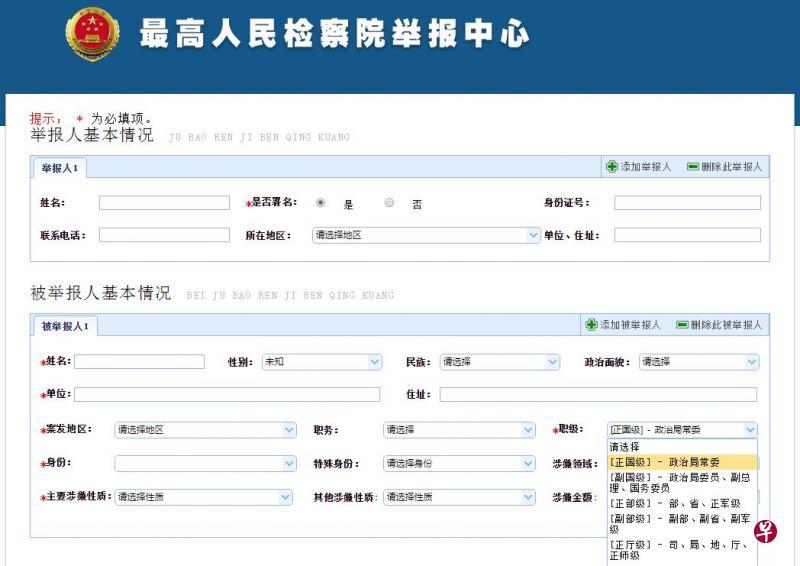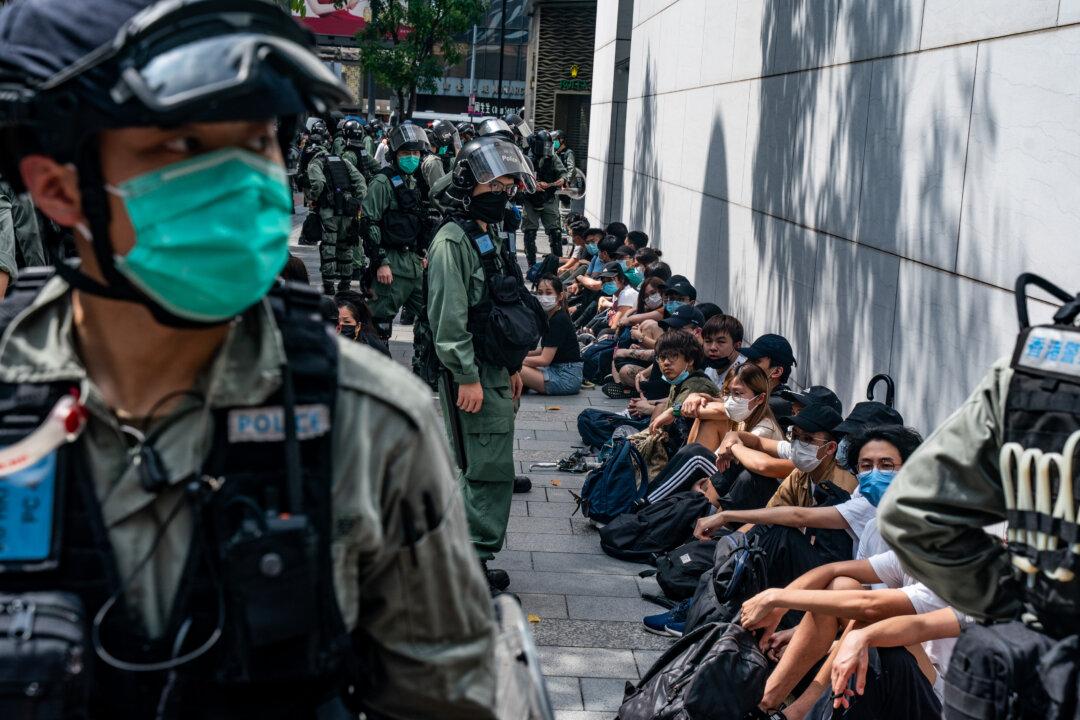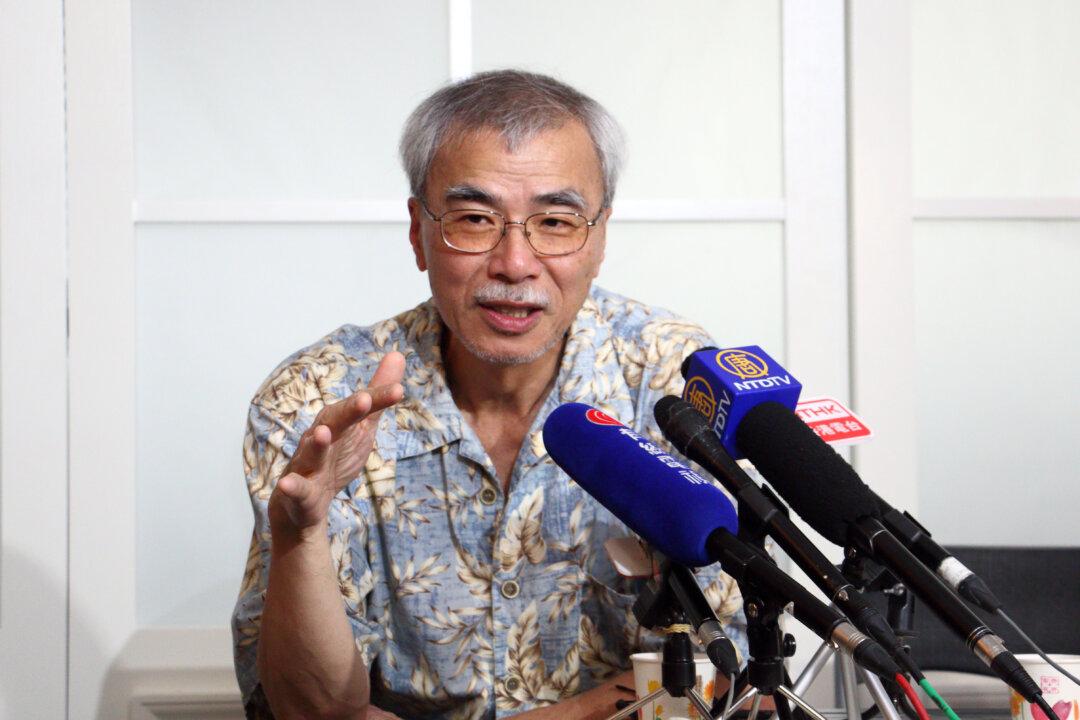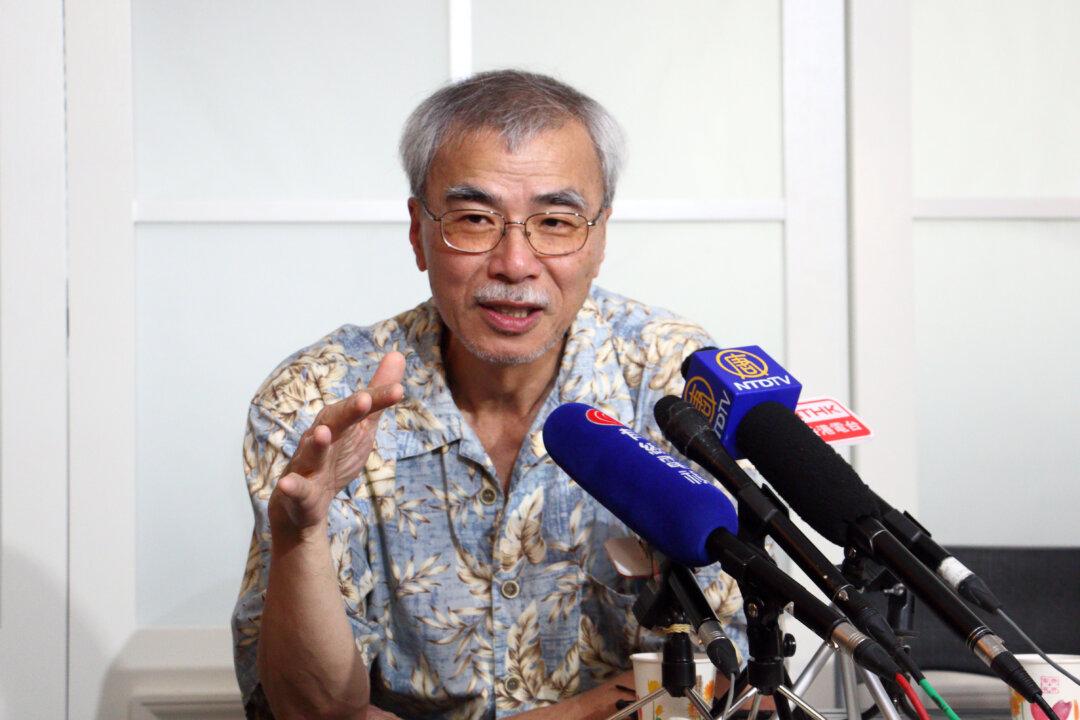The Chinese regime’s top prosecuting agency recently allowed individuals to report the most elite officials for wrongdoing on its website, a relaxation of rules that an old Chinese political reformer thinks could trigger a wave of complaints against former Chinese Communist Party leader Jiang Zemin.
On April 20, the state-run Beijing Youth Daily reported that the Supreme People’s Procuratorate allowed for anonymous complaints to be filed online against all ranks of Chinese officials. A screenshot of the Procuratorate’s webpage showed a drop-down menu with the first option being the rank of “Politburo Standing Committee,” the top decision making body in the Chinese regime. Several mainland and overseas Chinese news media also carried this news.
The drop-down menu has since been replaced with an open text box, but earlier official reporting suggests that it is fair game to report serving and retired officials at the highest rank of the regime’s political hierarchy.
Bao Tong, the aide of the late Party general-secretary Zhao Ziyang, told The Epoch Times that the Procuratorate’s move, which implicitly includes complaints against former Party leaders, was irregular, but “very good news.”
“Mao Zedong went out of control with the Cultural Revolution, while Deng Xiaoping brazenly ordered the June 4 incident” in 1989, said Bao, referencing the Chinese military’s massacre of student demonstrators in Tiananmen Square.
The reform-minded Bao and Zhao both lost their personal freedoms shortly after the massacre as they refused to endorse Deng’s authoritarian turn. Deng later named Jiang Zemin, then Shanghai chief, as his successor.
“Not wanting to be idle, Jiang Zemin suppressed Falun Gong, a shameless, extremely inhuman thing,” Bao said.
Jiang’s persecution campaign against Falun Gong, a traditional Chinese spiritual discipline that involves slow-motion exercises and teachings of truthfulness, compassion, and tolerance, is one of the worst human rights abuses in modern Chinese history.
The Chinese regime’s security apparatus was handed a budget that at time exceeded the military to facilitate the surveillance and capture of practitioners, which numbered 70 million to 100 million according to official and practitioner estimates before the persecution on July 20, 1999.
The regime forced Falun Gong practitioners, at the pain of medieval-style tortures and brutal abuse, to renounce their faith. Over 4,000 practitioners were killed from such abuse for refusing to be “transformed,” according to Minghui.org, a clearinghouse for firsthand accounts and figures about the persecution. Owing to the difficulty of getting information out of China, the actual figures of persecution deaths are believed to be significantly higher.
The hundreds of thousands of practitioners in Chinese detention centers and prison are at risk of being killed for their organs, according to researchers of forced organ harvesting in China. The United States House of Representatives and the European Parliament have in recent years condemned the Chinese regime for its organ crimes. Hundreds of thousands of Falun Gong practitioners are believed to have had their organs pillaged for use in China’s transplantation industry.
“I believe that all that should be inscribed in history, and be punishable by law,” Bao Tong said of the atrocities ordered by Jiang Zemin. “Now isn’t it so that complaints can be filed against the highest ranking officials? So it is necessary to openly report [Jiang]. This is an extremely excellent arrangement.”
Bao believes that the Xi Jinping leadership should have been open and transparent in broadcasting the Procuratorate’s rule relaxation, but he suspects that there must have been “certain special reasons” for the “discrete” announcement.
He also hopes that the Xi leadership should ensure that Chinese citizens who lodge complaints do not face reprisals, but didn’t provide further elaboration.
While complaints can be filed anonymously, the Chinese internet police possess high-tech surveillance and tracking software capable of locating individuals by their IP address—the likely reason for Bao Tong’s concerns for the safety of would-be whistleblowers.
The timing of the Procuratorate’s recent move is noteworthy.
On April 19, the State Council of the Chinese regime and the Communist Party—a Cabinet-type body—issued regulation meant for all Party cadres in leadership positions. Two provisions in the regulation required these leading cadres to report their “family matters” and “family property” to the central authorities.
The State Council regulation may be particularly applicable to Jiang and his cronies, who leveraged their position to enrich themselves and their families.
Jiang Mianheng, the elder son of Jiang Zemin, was able to build a state telecommunications empire in the 1990s and 2000s despite having no management experience or capital. The younger Jiang eventually earned the moniker of China’s “telecommunications king.”
Zeng Wei, the son of Jiang Zemin’s right-hand man Zeng Qinghong, had splashed out $32.4 million for a 106-year-old house in Sydney in 2008. Zeng Wei had also reportedly said that he was only interested in business deals where he could make at least $100 million in profit.
The Procuratorate’s rule relaxation also came five days before the anniversary of a key event in the persecution of Falun Gong.
On April 25, 1999, about 10,000 Falun Gong practitioners journeyed to Beijing to petition the central authorities to allow them a safe environment to practice their faith. Later that night, Jiang Zemin framed the peaceful appeal as a “siege” on the Communist Party headquarters of Zhongnanhai and vowed that Marxism and atheism would “defeat” Falun Gong in a letter sent to top Party officials.
The Xi Jinping leadership has made surprising moves near the anniversary of April 25 in recent years.
On May 1, 2015, the Supreme People’s Court relaxed regulations for the acceptance of criminal complaints. This led to Falun Gong practitioners filing over 200,000 complaints against Jiang Zemin for crimes against humanity and genocide.
Near April 25 in 2016, the Xi leadership made three unusual moves: Xi announced that the regime would “amicably settle reasonable and lawful appeals” from citizens; four leading security officials, including one who oversaw the brutal persecution of Falun Gong practitioners, were abruptly purged; and Xi promised a gentler approach to religious groups in China at a high-profile conference on religion.
Gu Qinger contributed to this article.




